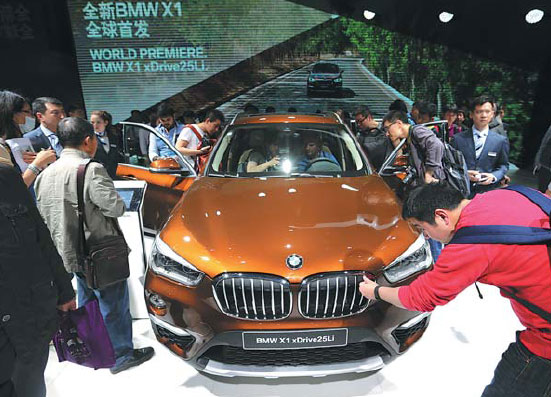Luxury cars tempt youth with tech
Luxury carmakers are upgrading in-car technologies in a bid to appeal to China's internet-savvy youth.
At the ongoing Auto China 2016, BMW Brilliance Automotive launched its new locally manufactured X1. The compact sport activity vehicle is targeted at the younger generation of Chinese customers who, according to the joint venture, "want to live real".
"Our studio in Shanghai redesigned and re-engineered the new BMW X1 locally for young Chinese, especially for customers younger than 30 years old," said Jochen Goller, senior vice-president of sales and marketing at BMW Brilliance Automotive.
In a survey of more than 3,000 BMW car users, industry specialists and experts, the luxury carmaker found that Chinese born in the 1980s and '90s are becoming the nation's mainstream consumers.
The research also found that consumers enjoy the creative process and believe innovation is essential. BMW said young Chinese consumers are looking for innovation, personality and an emotional connection with their purchases.
"There are really big demands on in-car connectivity," Goller said.
"It is a must, so we have the iDrive and BMW Connected installed as standard in the new X1. It also has higher configuration variants, providing remote services."
The company will take orders for the new BMW X1 from May, months after its 2 Series Active Tourer launched in March on the Chinese market at a slightly lower price range.
Around 56 percent of vehicles sold worldwide in 2020 will be equipped with in-car connectivity, according to an Accenture Strategy report, with the percentage jumping to 77 percent by 2025.
The report also said consumers are not willing to pay extra for in-car connectivity, which would allow them to use smartphones, tablets and other mobile connected devices in their vehicles.
The Audi Multi-Media Interface Connect will give free internet access in its recently launched Audi Q2 compact SUV.
General Motors' OnStar system was among the first connectivity systems brought to the Chinese market. It was free for the first year, but incurred a service fee in the second year. The system by the United States carmaker has thus far failed to catch on with drivers.
But carmakers say bandwidth problems in the nation's wireless networks have created issues with incar connectivity.
Accenture said a single carmaker adapting to connectivity technologies must work with tech companies, communications operators and internet service providers to develop the technology.
Currently, State controlled mobile operators are working on more advanced mobile communication networks capable of transferring more data within a shorter period of time.
"The 5G data transmission speed is 100 times faster than 4G mobile networks and there will be one million access points in one square kilometer," said China Mobile Deputy General Manager Li Yue.
"It will connect the car to the internet in milliseconds, potentially make communications among vehicles a reality."
haoyan@chinadaily.com.cn
|
Visitors inspect the BMW X1 at the ongoing Beijing auto show. Wang Zhuangfei / China Daily |



















